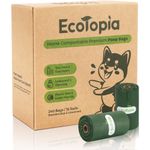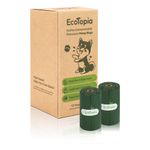EcoTopia Highlights Biodegradable Certifications as a Vital Step Toward Global Sustainability
As global plastic waste continues to rise, EcoTopia is urging both consumers and businesses to embrace biodegradable alternatives that meet certified environmental standards. In a new report, EcoTopia outlines the importance of biodegradable certifications and their role in the fight against plastic pollution, citing key international policies and data supporting their widespread adoption.
The Global Plastic Crisis: A Call for Immediate Action
The world is facing a plastic pollution crisis that affects every corner of the planet. According to the United Nations Environment Programme (UNEP), an estimated 300 million tons of plastic are produced annually, and millions of tons of this waste end up in landfills, rivers, and oceans. This plastic waste has devastating consequences for wildlife, marine ecosystems, and human health.
In 2018, the UNEP called for an urgent shift toward biodegradable and compostable alternatives to plastic in order to curb the long-term damage caused by plastic waste. "We are choking our oceans, poisoning our ecosystems, and contributing to climate change with every piece of plastic that doesn’t get recycled," said Inger Andersen, Executive Director of UNEP.
Certifications: Ensuring Genuine Sustainability
The key to ensuring that biodegradable products live up to their environmental claims is certification. ASTM D6400 and EN 13432 are the leading certification standards for biodegradable and compostable products. These standards require that products break down within a specific timeframe and do not leave toxic residues behind.
EcoTopia has embraced these certifications to ensure its products contribute meaningfully to sustainability efforts. “Certification is crucial for building consumer trust,” says Abner Deng, founder of EcoTopia. “Without certification, it’s impossible to know whether a product is truly biodegradable or just making unsubstantiated claims.”
International Policy Support for Biodegradable Solutions
The adoption of biodegradable products is supported by several international policies. The European Union’s Single-Use Plastics Directive (2019) aims to reduce plastic waste by promoting alternatives like biodegradable packaging. Similarly, the U.S. Environmental Protection Agency (EPA) is working to expand the availability of biodegradable products through initiatives like the Plastic Pollution Reduction Act.
Conclusion: Empowering Change Through Education and Certification
EcoTopia is committed to educating consumers about the importance of biodegradable certifications and their role in reducing plastic waste. By promoting transparency and certification, EcoTopia aims to empower consumers to make informed choices that contribute to a cleaner, more sustainable future.





